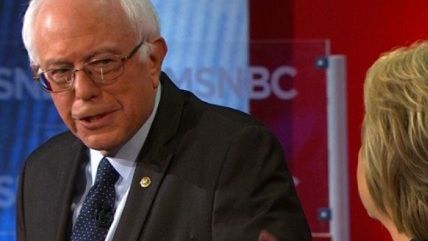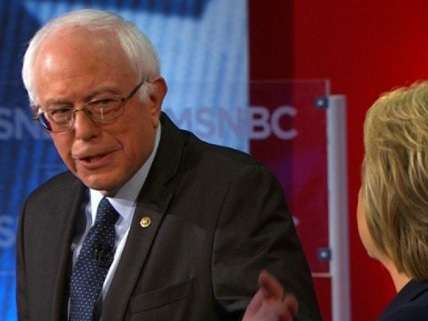Of Course Bernie Sanders is Part of the Establishment Too
Super PACs have spent more in support of Sanders than any other Democratic candidate.


At tonight's MSNBC debate, Sen. Bernie Sanders (I-Vt.) responded to Hillary Clinton boasting about Vermont Democratic officeholders and ex-officeholders endorsing her by saying it was "a fact" that Clinton had "the entire establishment or almost the entire establishment behind her," while he had a million people giving "27 bucks apiece."
But Sanders shouldn't kid himself or his supporters. He has the support of the Democratic establishment as well. While nominally an Independent, Sanders caucuses with the Democrats and has not faced a Democratic opponent in a general election since Larry Drown in 2004. Sanders and Clinton voted the same way 93 percent of the time.
More importantly, as The New York Times noted, despite Sanders' rhetoric, he has had more money spent on him by Super PACs than any other Democratic candidate this cycle, with the super PAC for just one labor union spending nearly $1 million so far. These unions represent part of the Democratic establishment as much as any of the endorsers Clinton has collected. The Supreme Court's Citizens United ruling permitted labor unions as well as companies to spend on political campaigning.
Sanders blasts one form of spending but not the other. Later in the debate, he said not all corporations were bad, because some were willing to work with the government on its agenda. There's a word for a political system where the government controls business and labor and clamps down on opposition—fascism. There's nothing anti-establishmentarian about it.
Not to be outdone on incredulous attempts to disown the establishment, Clinton also denied she was part of the establishment. In fact she said she couldn't think of anyone else who had called her that. Now she has me. And Google. Her argument against being part of the establishment? She's a woman, as if it were impossible for a woman to be a part of the establishment. It's 2016, not 1956. Such an argument could just be a shade of things to come.

Show Comments (32)